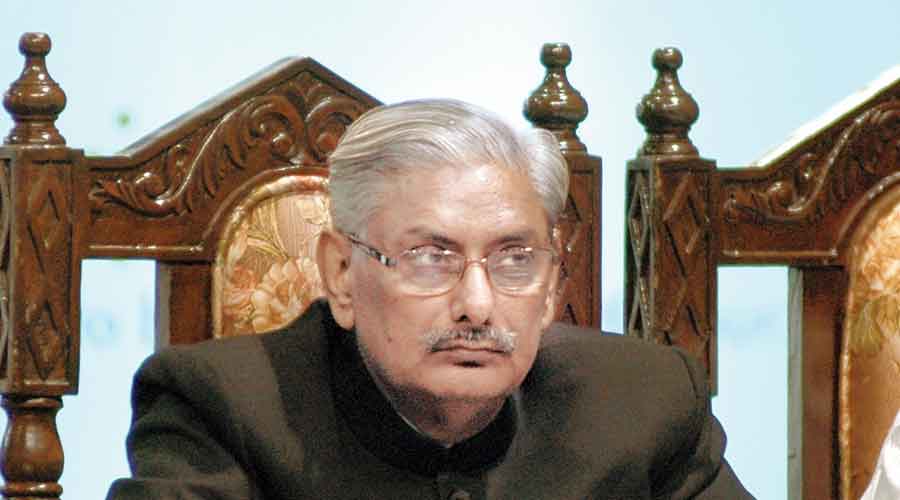Justice Arun Mishra, whose term as Supreme Court judge will be remembered among other controversies for his effusive praise of Prime Minister Narendra Modi as a “versatile genius, who thinks globally and acts locally”, retired on Wednesday.
“I have dealt with every case with my conscience. Sometimes I have been very harsh in my conduct directly or indirectly. Nobody should feel hurt. Analyse every judgment and don’t colour it this way or that way. If I have hurt anybody then please pardon me, pardon me, pardon me,” Justice Mishra said at a brief farewell held over videoconference.
“Even in the last case of contempt, AG said that he didn’t want any punishment (for Prashant Bhushan) but...,” Justice Mishra said, without completing his sentence.
Justice Mishra headed the three-judge bench that convicted senior lawyer Bhushan of criminal contempt for two tweets, triggering outrage and protests. It eventually imposed a fine of Re 1.
In his farewell speech on Wednesday, attorney general K.K. Venugopal said personally he would have been happy had the bench not punished Bhushan. “But his judgment elaborately laid down the contempt principle and it will be debated for a long time,” he said.
The farewell too ended in controversy, with Supreme Court Bar Association president Dushyant Dave not getting a chance to speak. By convention, it is the SCBA that hosts a retiring judge’s farewell and its president who delivers the address.
Dave, known to speak his mind, alleged that he had been deliberately muted and that the Supreme Court had come to such a state where judges were afraid of the Bar.
On February 23, in his vote of thanks at a global jurists’ conference, Justice Mishra had showered praise on the Prime Minister and described him “an internationally acclaimed great visionary”.
The SCBA, led by Dave, had two days later issued a statement expressing deep concern and dismay at the effusive praise that it said went beyond “formal courtesy” and diluted the perception of impartiality of the judiciary. It reminded Justice Mishra that judges are often called upon to decide cases against the executive, and that it is the “foundational obligation” of judges to maintain a dignified distance from the executive.
Some members of the SCBA convened a meeting on May 11 to remove Dave as president and from his primary membership over his criticism of Justice Mishra. However, with the help of the majority in the SCBA, Dave removed the prime mover of the campaign against him, Ashok Arora, from the post of secretary. The dispute is now pending with Delhi High Court.
This wasn’t the first controversy Justice Mishra, known to be one of the most hardworking judges in the Supreme Court, was involved in.
On January 12, 2018, four seniormost judges of the Supreme Court held an unprecedented news conference and accused then CJI Dipak Mishra of ignoring their seniority and allocating all important and sensitive cases to his own preferred judges. They did not take any names but the message was clear. Justice Mishra had been entrusted with the sensitive case of the death of judge B.H. Loya in suspicious circumstances.
Loya, 48, who was hearing the CBI case in which current home minister Amit Shah was an accused, allegedly had a cardiac arrest and died on December 1, 2014, in Nagpur where he had gone to attend a wedding. Shah was discharged in the case weeks later. Some NGOs moved the Supreme Court for a court-monitored SIT probe into the judge’s death.
Stung by the criticism of the four judges, Justice Mishra released the case from his bench. A bench headed by CJI Misra then heard the matter and dismissed the appeal for a probe into judge Loya’s death.
After the news conference by the four judges, Justice Mishra had been in tears at an internal meeting. “It’s not me who had asked for work, but every successive Chief Justice of India had entrusted me with heavy work,” Justice Mishra, who suffers from a bad back because of arthritis, had told this correspondent. He was trusted by successive CJIs — Justices H.L. Dattu, T.S. Thakur, J.S. Khehar, Dipak Misra, Ranjan Gogoi, and S.A. Bobde —since his elevation to the Supreme Court on July 7, 2014, from Calcutta High Court where he was the Chief Justice.
Justice Gogoi had been part of the judges’ news conference but when he was elevated as Chief Justice, he chose to have Justice Mishra as his co-judge along with Justice Sanjiv Khanna to rebut the sexual harassment allegations levelled against Justice Gogoi by a woman employee of the court.
On Wednesday, Chief Justice Bobde said to Justice Mishra that he had been “a beacon of courage and fortitude in discharging your duties”. “Even on the personal front I’m aware of the great difficulties you have faced and despite that carried out your duties. I don’t know many people who have carried out work so bravely despite so many difficulties. You, Justice Mishra, are leaving behind a legacy of courage and fortitude,” Justice Bobde said.










